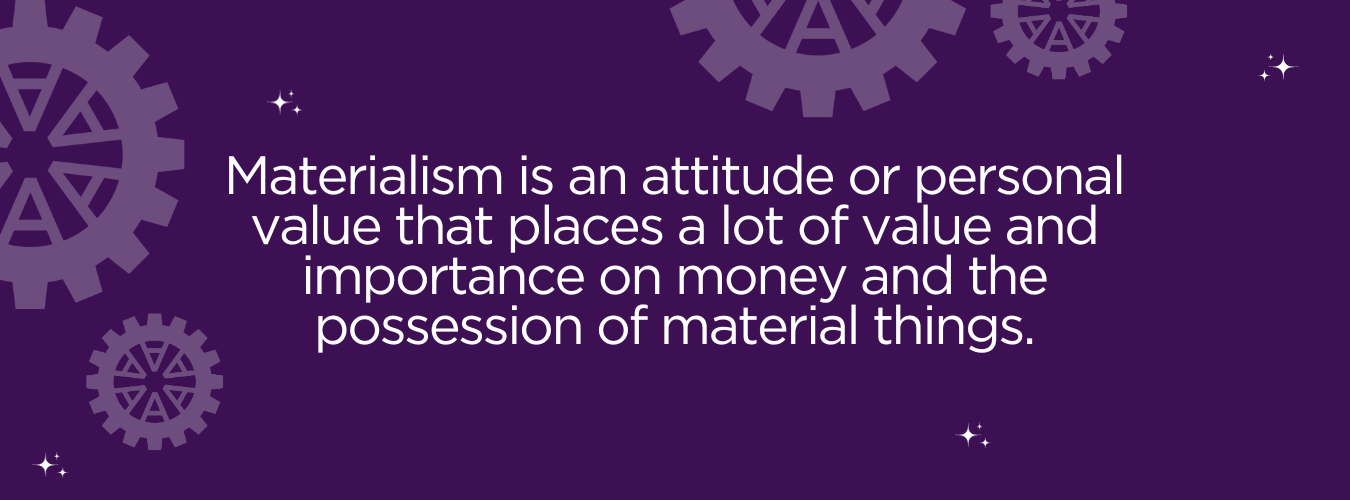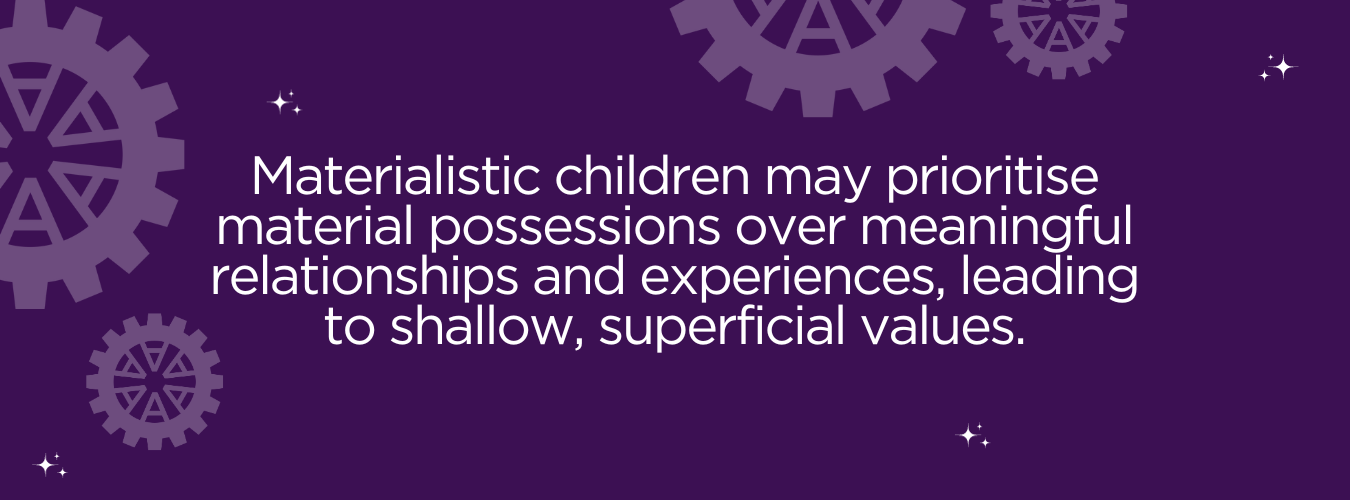Materialism in Children

In our fast-paced world, materialism has firmly woven itself into the fabric of our lives. Neither children nor families remain untouched by the pervasive influence of consumerism and material culture.
Recognising the profound impact of materialism on children and families is essential for parents, educators, and society as a whole. Materialism in children becomes concerning when it overshadows other crucial values, often linked to low self-esteem. This imbalance can lead children into a cycle of materialistic pursuits, wherein owning desirable things becomes a way to seek validation and self-worth.
In this blog post, we delve into the intricate concept of materialism in children, unravelling its roots, its effects, and most importantly, strategies to counterbalance materialistic tendencies.
Is your child struggling to keep up with schoolwork? Are they falling behind? Are they bored in class? Or are you looking for extension work for your child? Check out our eBook to learn more about how we help your child improve academically and build confidence through our in-centre after-school tuition.
Understanding Materialism in Children
Materialism in children refers to an excessive craving for material possessions and a fixation on consumer culture. This inclination often arises from diverse influences, including advertising, peer pressure, and parental guidance.
In a society bombarded with promotions for the latest gadgets, fashion fads, and toys, it's hardly surprising that children as young as five can adopt a materialistic outlook.
Materialism is a mindset of valuing money and possessions highly. The definition of "a lot" of material things is subjective and varies among families and cultures, shaped by their beliefs and family values.

Why Do Some Children Become Materialistic?
Psychologists have discovered that materialism in children begins to take shape around the age of eight or nine. As they grow older, self-awareness develops, leading to comparisons with others and potential struggles with self-esteem.
In late adolescence, most individuals become more comfortable with their identities, leading to a natural decline in their materialistic inclinations.
If a young child's environment consistently portrays money and possessions as the ultimate rewards and keys to happiness, they are more likely to pursue materialism as a means to boost their self-esteem.
Similar to many learned behaviours, the most potent influences on children include their parents' attitudes, the impact of advertising messages they encounter, and the values of their friends, family, and peers.
The Effects of Materialism on Children
- Shallow Values: Materialistic children might value material possessions more than meaningful relationships and experiences, fostering shallow and superficial values.
- Diminished Self-esteem: The continuous craving for more possessions can result in a cycle of low self-esteem, as children may link their self-worth to their belongings.
- Lack of Empathy: Materialistic tendencies can hinder the growth of empathy and compassion, as the focus remains on personal desires rather than the needs of others.
- Environmental Consequences: Materialism fuels overconsumption, causing environmental problems such as pollution and resource depletion. These issues will profoundly affect the future world of today's children.

How to Tell
Many parents concerned about balancing their child's materialism have identified warning signs, such as:
- Always expecting money or toys for completing routine tasks.
- Throwing tantrums when they can't have the latest trendy gadgets, comparing their situation to what other parents are doing for their children.
- Refusing to part with old toys that haven't been used for years.
- Frequently claiming boredom or lack of playthings, despite having ample toys or activities available.
- Losing interest quickly in items they once considered essential just a week ago.
How to Reduce a Child’s Materialism
In a New York Times article, a study involving 71 families with children scoring high on materialism was discussed. Half of the children in the study participated in eight-week sessions aimed at reducing their materialistic tendencies.
Compared to the control group, these children exhibited a significant decrease in their materialism scores and an improvement in their self-esteem.
Recommendations for Parents with Materialistic Kids
- Provide your children with a regular allowance divided into three categories: saving, spending, and giving. Engage in conversations with them about the reasons behind their financial decisions.
- Discuss your family's income and expenses openly, helping your kids understand how money is managed. Teach them to distinguish between essential needs and wants, emphasising priorities such as family experiences over material possessions like flashy cars.
- Address the influence of advertising and peer pressure, highlighting how these factors can shape desires. Together, identify and discuss real-life examples as they occur.
- Encourage your children to find a role model who demonstrates a healthy balance between desires, spending, and needs. Maintain these open discussions as a family throughout their pre-teen and teenage years.

Nurturing Essential Values in Children
- Promote Thankfulness: Cultivate gratitude in children by engaging in daily discussions about the things they appreciate. This practice nurtures contentment, diminishing their constant desire for more.
- Prioritise Experiences: Shift the focus from material gifts to meaningful experiences. Engage in activities that encourage learning, creativity, and bonding, emphasising the value of shared moments over material possessions.
- Lead by Example: Children often emulate adult behaviour. Demonstrate mindful consumption and highlight non-materialistic values like kindness, generosity, and integrity.
- Manage Screen Time: Excessive exposure to ads and social media can fuel materialistic tendencies. Set screen time limits to reduce the impact of consumer culture on children's minds.
- Teach Money Skills: Help children understand money's value, emphasising saving and budgeting. Teaching responsible financial habits instils a sense of accountability, curbing impulsive spending.
- Encourage Giving: Involve children in charitable activities, showcasing the joy of helping others. Acts of kindness nurture empathy, countering materialism's self-centred aspects.
- Promote Critical Thinking: Teach children to analyse ads and media critically. Enable them to recognise persuasive techniques, empowering them to make informed choices instead of succumbing to impulsive buying.
- Develop Self-Confidence: Assist children in building self-assurance based on their talents and qualities rather than material possessions. Encourage their hobbies, emphasising personal growth and achievements beyond material measures. Nurturing their passions fosters a strong sense of self-worth, reducing materialism's appeal.

Experts propose reducing a child's exposure to materialism and enhancing their self-esteem by focusing on their emotional needs instead of materialistic desires. This involves being cautious not to reward or express love solely through material gifts and refraining from using material possessions as punishments, such as taking away gadgets or toys.
When it comes to a child's allowance, it's advisable to teach them early on that part of their spending money, starting as young as two, should cover essential needs like bus fare and lunch. As they grow older, the allowance can gradually encompass expenses like clothing, school supplies, new toys, and entertainment.
Initially, cash payments are suitable, but as they mature, setting up an online bank account linked to yours can facilitate automatic transfers. This approach allows them to manage their money online and provides the option of an EFTPOS or debit card for independent spending.
Addressing materialism in children requires a joint effort from parents, educators, and society.
By fostering values such as gratitude, empathy, and responsible consumption, we can help children navigate the materialistic world while nurturing their character and overall well-being.
Through these collective efforts, we can empower the next generation to adopt a more balanced and fulfilling approach to life, emphasising genuine connections and contentment within the family and society.
At NumberWorks’nWords, we understand the importance of nurturing not only academic success but also the overall well-being of your child. If you're looking to support your child's holistic development, book a free assessment or find a centre near you today. Our tailored programs not only enhance your child's maths and English abilities but also instil crucial life skills, helping them succeed both inside and outside the classroom. Join us in shaping a brighter future for your child!




